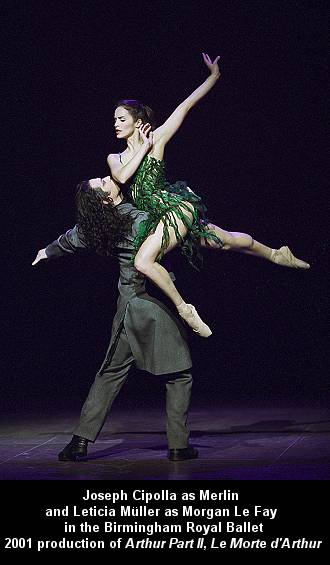|
<< -- 3 -- Roderic Dunnett A DEEPER PLANE

Parker's translation from innocent Arthur (Pt 1) to mother-perverted
Mordred offer him a few moments to flower; and into the final set-pieces
-- Lancelot versus Gawain, and (fatally) Arthur against Mordred (Mordred
slays his father-uncle with a coward's blow, amid a faked reconciliation)
-- Bintley injected a growing intensity; while Bishop Bedwin (David Morse)
added some amiable (again Helpmannesque) clowning. The ensemble work, despite
a beautiful (if slightly prim) set piece in Act I, seemed arguably less
inspired that in Part I (where the young knights' dance, for instance, was
unforgettable).
McCabe's music, at best, feels on a deeper plane. Where Bintley probes
psychology lightly, McCabe seems to burrow, and winkle out hidden layers.
This feels like a consistently well-judged score, professionally served-up
(a measure of the lucidity of design in Bintley's scene-by-scene timed scenario,
as well as the calibre of their collaboration). Despite much alluring orchestration
-- the score splendidly delivered, finely honed in all its dark and glinting
contrasts, by Barry Wordsworth's orchestral players -- McCabe's detail seemed
always relevant, never merely effect : folksy violins in the group dance,
then oboe and flute over warm, thickening string textures, ceding to a gorgeously
played, rapt clarinet line in the Act I Lancelot-Guinevere duet; mysterious,
murky upper strings as the fatal apple finds it way to the doomed Gareth;
nervy harp runs, soft whining trumpet and leering saxophone, yielding to
paired clarinets and flute roulades over ominous brass for Morgan's first
kiss on Merlin, and an unpleasant saxophone wind-up (a vivid commentary
that told all without one even having to watch the stage action, rather
less impressive than Morgan's seduction of Arthur in Act I); the Queen's
chaconne-like dance; then a seqential woodwind figure (oboe, clarinet, bassoon),
picked up by trumpets for Gareth's mortal struggle, and mocking trumpets
and clarinets (in what feels like a sudden retrograde), applied like a terrifying
brake.

Perhaps nowhere are McCabe's fingerprints more effective than in Morgan's
second triumph over Merlin (after, arguably, from the dramatic point of
view, one kiss too many), shortly before Mordred finally asserts himself
to seize the throne. McCabe produces magical effects by merging what sounded
to my ear like viola, cor anglais and saxophone; then conjoins low saxophone
with horns (and trombones?), and moves on to strings alone, to produce a
funereal sound as eerie as Bartók's Music for Strings, Percussion
and Celesta (his most overtly proclaimed source); then launches an arching
slow drum pattern (Bartók again) of unnerving horror, a foretaste
of the battle to come.
Somehow McCabe's score always seems to be on the ball, and this Bartókian
undercurrent, more often than not, suggests personality, shifting mood,
idyllic and perverted psychology, human consistency and inconsistency, more
effectively than the histrionic, slightly campy visuals. Furnishing a secure,
seamless underlay is, of course, the composer's role. But for a second time
McCabe's Arthur score does Bintley and Birmingham proud.
Copyright © 27 May 2001
Roderic Dunnett, Coventry, UK
 VISIT THE JOHN McCABE WEBSITE
VISIT THE BIRMINGHAM ROYAL BALLET WEBSITE
READ THE STORY OF THE BINTLEY/McCABE COLLABORATION
READ RODERIC DUNNETT'S REVIEW OF 'ARTHUR PART I'
<< Music
& Vision home
Peter Breiner >>
VISIT THE JOHN McCABE WEBSITE
VISIT THE BIRMINGHAM ROYAL BALLET WEBSITE
READ THE STORY OF THE BINTLEY/McCABE COLLABORATION
READ RODERIC DUNNETT'S REVIEW OF 'ARTHUR PART I'
<< Music
& Vision home
Peter Breiner >>
|

